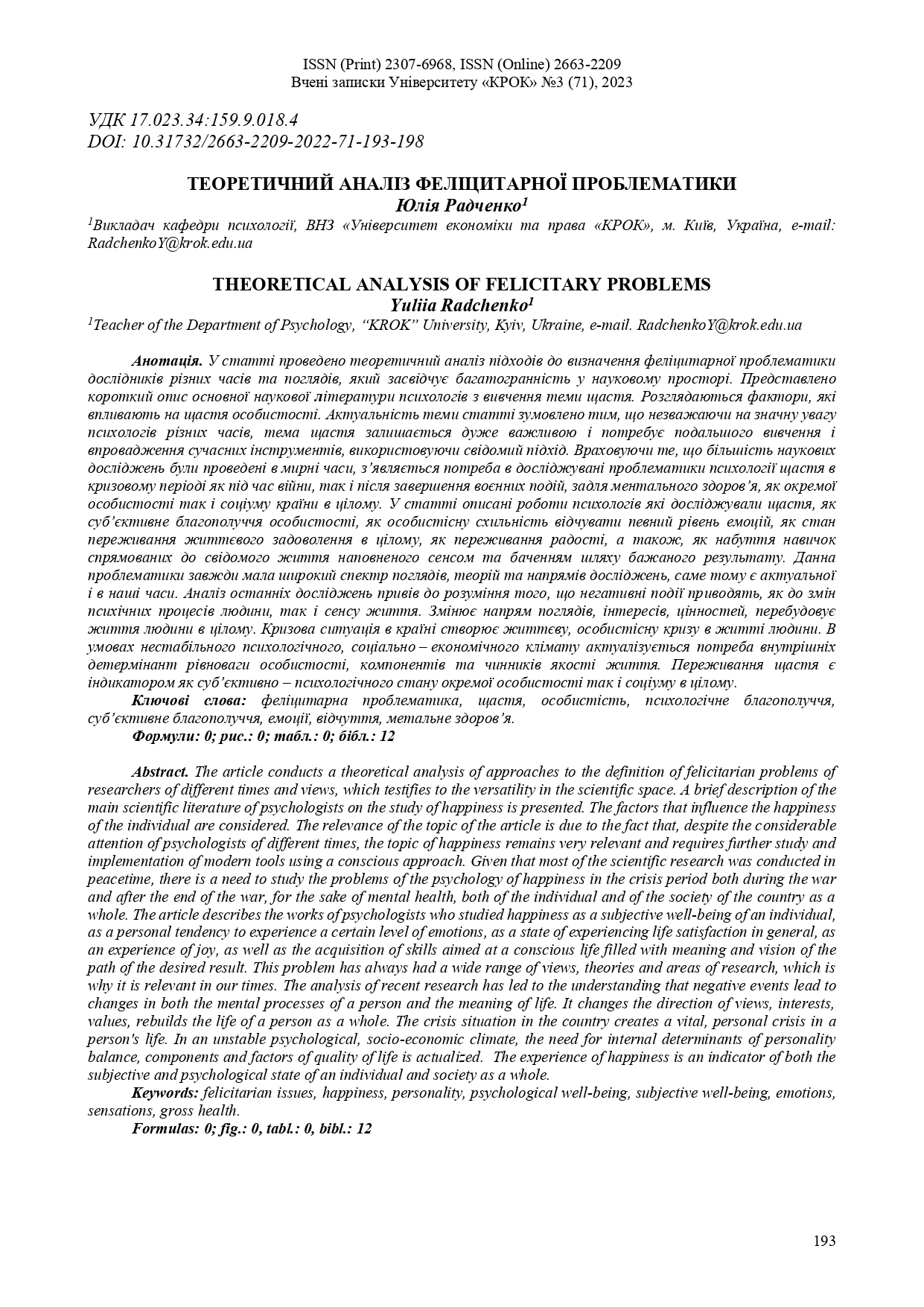THEORETICAL ANALYSIS OF FELICITARY PROBLEMS
DOI:
https://doi.org/10.31732/2663-2209-2022-71-193-198Keywords:
felicitarian issues, happiness, personality, psychological well-being, subjective well-being, emotions, sensations, gross healthAbstract
The article conducts a theoretical analysis of approaches to the definition of felicitarian problems of researchers of different times and views, which testifies to the versatility in the scientific space. A brief description of the main scientific literature of psychologists on the study of happiness is presented. The factors that influence the happiness of the individual are considered. The relevance of the topic of the article is due to the fact that, despite the considerable attention of psychologists of different times, the topic of happiness remains very relevant and requires further study and implementation of modern tools using a conscious approach. Given that most of the scientific research was conducted in peacetime, there is a need to study the problems of the psychology of happiness in the crisis period both during the war and after the end of the war, for the sake of mental health, both of the individual and of the society of the country as a whole. The article describes the works of psychologists who studied happiness as a subjective well-being of an individual, as a personal tendency to experience a certain level of emotions, as a state of experiencing life satisfaction in general, as an experience of joy, as well as the acquisition of skills aimed at a conscious life filled with meaning and vision of the path of the desired result. This problem has always had a wide range of views, theories and areas of research, which is why it is relevant in our times. The analysis of recent research has led to the understanding that negative events lead to changes in both the mental processes of a person and the meaning of life. It changes the direction of views, interests, values, rebuilds the life of a person as a whole. The crisis situation in the country creates a vital, personal crisis in a person's life. In an unstable psychological, socio-economic climate, the need for internal determinants of personality balance, components and factors of quality of life is actualized. The experience of happiness is an indicator of both the subjective and psychological state of an individual and society as a whole.
Downloads
References
Achor S. (2010, September 14). The Happiness Advantage: The Seven Principles of Positive Psychology That Fuel Success and Performance at Work.
Argyle M. (1987). The Psychology of Happiness, Methuen.
Bruckner P. (2000). L`euphorie perpetuelle. Essai sur le devoir de bonheur. Bernard Grasset. Paris 2000. https://djvu.online/file/aomkR4SALC0ch
Diener Ed., Chan M.Y. (2011). Happy People Live Longer: Subjective Well-Being Contributes to Health and Longevity. Applied Psychology: Health and Well-Being, pp. 1–43.
Frankl V. (July 1, 2000) Recollections: An Autobiography, 144 pages, ISBN 9780738203553.
Izard Carroll E. (31 October 1991). The Psychology of Emotions (Emotions, Personality, and Psychotherapy).
Lyubomirsky S. (Dec 27, 2007). How to Be Happy: A New Approach to Getting the Life You Want.
Lyubomirsky S., Sheldon K.M., Schkade D. (Dec 30 2008). Pursuing happiness: The architecture of sustainable change. Review of General Psychology, 111–131.
Солярік К. С., Сингаївська І.В. (02 грудня 2021р.)Аналіз вміння особистості бути щасливою. Держава, регіони, підприємництво: інфоррмаційні, суспільно – правові, соціально – економічні аспекти розвитку: тези доповідей ІІІ Міжнародної конференції. К.:Університет «КРОК».
Seligman M. (anuary 1, 2010). In search of happiness. How to enjoy life every day.
Veenhoven R. (Jan 1, 1993). Happiness in nations: Subjective appreciation of life in 56 nations. World Database of Happiness. ISBN 90-72579-46
Vohs K. (May 15 2019) Negative personal experiences add meaning to life, University of Minnesota Professor 2019-05-negative-personal-life.pdf.

Downloads
Published
How to Cite
Issue
Section
License

This work is licensed under a Creative Commons Attribution-NonCommercial 4.0 International License.

